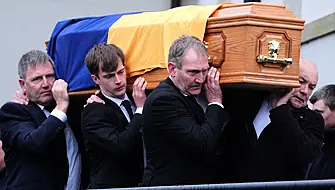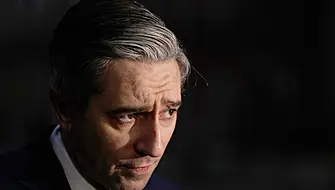Ross Outram, who was jailed for life for the murder of 90-year-old Paddy Lyons, has lost his appeal against conviction.
The Court of Appeal said that his suggestion that an elderly man who had sustained a serious beating resulting in a brain injury, then independently and unconnected to that assault, sustained a fatal fall, stretched credulity beyond rational limits.
Outram (30) of Ferryland, Waterford Road, Clonmel in Co Tipperary, was found guilty in 2019 by a Central Criminal Court jury of murdering Mr Lyons at Loughleagh, Ballysaggart, Lismore, Co Waterford, at a time unknown between February 23rd and 26th, 2017. He was the oldest man in his village.
Blood smeared down face
The Central Criminal Court trial heard that the farmer's body was discovered slumped in his armchair at his home, with blood smeared down his face.
Mr Lyons had suffered multiple blows to his head and neck from a blunt weapon and had fractures of his hip joint, jawbone and ribs. The hip fracture was given as the cause of death.
He had lived alone on his farm, with no running water, and had "trusted everyone", the court heard.
However, he became the victim of what trial judge Justice Paul Coffey described as a "truly shocking and outrageous" attack by Outram, who had previous convictions for burglary and assault.
Mr Lyons' home help, Mary Fennessy, who knew him for over 20 years said that "if anyone deserved a place in heaven it's Paddy".
Greatly missed
"He was happy with simple things, had a great love for life and loved meeting people. He was a well-known, well-respected man of our community and he is greatly missed," she said in a victim impact statement.
The three-week trial heard medical evidence that Mr Lyons suffered a “stiffness or fusion” of his right shoulder during childbirth and could only keep it in one position.
However, Outram told gardai in interviews that he had “fought back” after Mr Lyons hit him with a walking stick and shovel. He had lied in his first six interviews.
Fall
His barrister, Michael O’Higgins, argued that he had acted in self-defence and that he could not be made liable for "a fall" which saw Mr Lyons break his hip if it was unconnected to the original injuries inflicted on him by the defendant.
Mr Justice Coffey told the jury that in order to convict Outram of murder it must be satisfied beyond reasonable doubt that Mr Lyons’ fall and the fracture of his hip was either directly caused by the multiple blows inflicted on him or it was reasonably foreseeable that it was a natural consequence of these blows.
The jury found him guilty and he was sentenced to life in prison.
Appeal
However, he appealed his conviction to the Court of Appeal earlier this year. Mr O’Higgins again argued that there was no proof that he caused the injury that led to the pensioner's death.
Justice Isobel Kennedy, who sat with Justice John Edwards and Justice Patrick McCarthy, delivered a written judgment on Friday.
“We cannot agree with Mr O’Higgins’ suggestion that it is not only necessary for the prosecution to prove that the appellant violently assaulted the deceased, but that the State must also prove that the appellant caused the deceased to fall, thus shattering his hip,” they wrote.
“Mr Lyons had lived in his home for many years, it would certainly be quite remarkable if on the very night he was assaulted he spontaneously and independently of the attack suddenly fell over obstacles in a familiar environment.
They said that the possibility that he was able to move in the aftermath did not relieve the appellant of criminal responsibility.
The court did not agree with the appellant’s submission that the judge had invited the jury to speculate on matters that contributed to the fall.
“In fact, on the contrary the judge’s charge was not only a model of clarity and good sense, but in fact on occasion was most favourable to the defence,” they wrote.
“The trial judge’s charge was a model of fairness and clarity,” they added. “When the issue arose regarding the hat and the absence of evidence concerning the presence or absence of blood on it, the judge dealt with the matter in a fair and balanced way.”
They accordingly dismissed the appeal.







